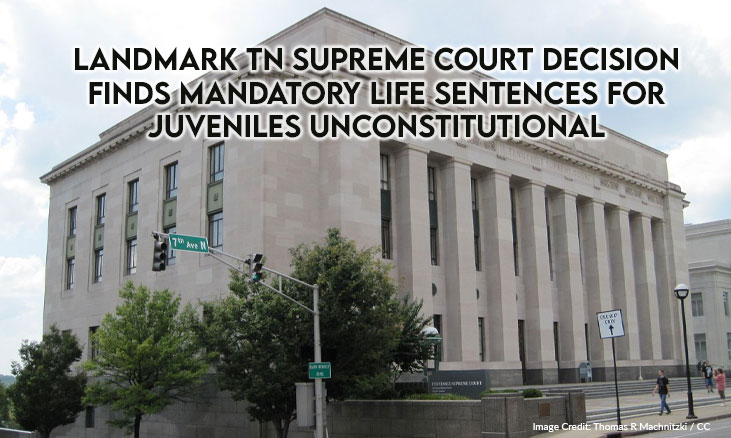Image Credit: Thomas R Machnitzki / CC
By Jamie Satterfield [The Tennessee Lookout – CC BY-NC-ND 4.0] –
In a landmark decision, a majority panel of the Tennessee Supreme Court on Friday struck down as unconstitutional mandatory life sentences for juveniles.
“In fulfilling our duty to decide constitutional issues, we hold that an automatic life sentence when imposed on a juvenile homicide offender with no consideration of the juvenile’s age or other circumstances violates the prohibition against cruel and unusual punishment under the 8th Amendment to the United States Constitution,” the state’s high court ruled in a decision made public Friday.
Justice Sharon Lee, who this week announced she would be retiring next year, authored the groundbreaking decision and was joined in the majority opinion by Special Justice William C. Koch Jr. and Justice Holly Kirby. Justices Jeffrey Bivins and Roger Page dissented.
The ruling comes in the case of Tyshon Booker, who was 16-years-old when he fatally shot G’Metrick Caldwell, 26, inside a car on Linden Avenue in Knoxville in November 2015. Knox County Assistant Public Defender Jonathan Harwell successfully convinced the high court to strike down the mandatory life sentence imposed against Booker, who was tried as an adult.
Tennessee law requires imposition of a life sentence as punishment for all offenders, including juveniles, convicted of either first-degree murder or felony murder.
In fulfilling our duty to decide constitutional issues, we hold that an automatic life sentence when imposed on a juvenile homicide offender with no consideration of the juvenile’s age or other circumstances violates the prohibition against cruel and unusual punishment under the 8th Amendment to the United States Constitution. – Tennessee Supreme Court opinion striking mandatory life sentences for juveniles convicted of murder
But the state’s Supreme Court held that such a mandatory sentence for juvenile offenders “does not square with the United States Supreme Court’s interpretation of the 8th Amendment.”
“When sentencing a juvenile homicide offender, a court must have discretion to impose a lesser sentence after considering the juvenile’s age and other circumstances,” Lee wrote in the opinion. “Here (in Booker’s case), the court had no sentencing discretion.”
The high court is not vacating Booker’s life sentence, however, and instead says he should be considered for parole once he has served at least 25 years. He has been behind bars since the 2015 fatal shooting, so he should become eligible for a parole hearing in 2040.
The opinion will impact other juveniles currently in prison under mandatory life sentences. In each of those cases, the opinion stated, the juvenile offenders should now receive individualized parole hearings after serving a minimum of 25 years.
“In remedying this constitutional violation, we exercise judicial restraint,” the high court opinion stated. “We need not create a new sentencing scheme or resentence Mr. Booker … Rather, we follow the policy embodied in the federal Constitution … and grant Mr. Booker an individualized parole hearing when his age and other circumstances will be properly considered.”
But the ruling means that no other juveniles convicted as adults in Tennessee of first-degree murder or felony murder will automatically receive life sentences — as remains the case for adults convicted of those crimes in the state. Instead, judges will have discretion to impose lesser sentences for juveniles as a result of Friday’s decision.

Justice Lee: Court must do its duty
Booker was inside a car with Cantrell and another juvenile, Bradley Robinson, when a fight broke out between Cantrell and Robinson. Booker testified at his trial in Knox County Criminal Court that he saw Cantrell reaching down for something in the front floorboard and heard Robinson yell, “He got a gun, bro.”
“Mr. Booker stated that when he saw (Cantrell) holding a gun and starting to turn toward him in the back seat, Mr. Booker shot (Cantrell) until he stopped moving,” the high court opinion stated.
Booker was convicted of felony murder in the shooting and sentenced to an automatic life sentence under Tennessee law. Harwell argued before the Tennessee Supreme Court that juveniles, by their very youth, are fundamentally different than adult offenders and should be given individualized sentencing hearings before their sentences are determined.
In the high court’s decision, the justices noted that the U.S. Supreme Court has already ruled that juveniles should not face the death penalty and that mandatory sentences of life without parole were unconstitutional. Because of those rulings, most states have abandoned mandatory sentencing for juvenile homicide offenders.
“Compared to the other 49 states, Tennessee is a clear outlier in its sentencing of juvenile homicide offenders,” Lee wrote in Friday’s decision. “So much so that Tennessee’s life sentence when automatically imposed on a juvenile is the harshest of any sentence in the country. No one, including the dissent, disputes that a juvenile offender serving a life sentence in Tennessee is incarcerated longer than juvenile offenders serving life sentences in other states.”
The Tennessee Legislature has refused to alter the law imposing mandatory life sentences with the possibility of parole to exclude juveniles. Bivins and Page argued in their dissent that the majority panel was trying to usurp the role of the Legislature with Friday’s decision. But the majority panel disagreed.
“The dissent claims, without any basis, that by upholding the protections of our United States Constitution, we are making policy,” Lee wrote. “But when the court does its duty and rules on the constitutionality of a statute, it makes no policy of its own. The court simply implements the policy embodied in the Constitution itself.
“Without question, the General Assembly determines policy and enacts law,” the justice continued. “This court’s duty is to apply the law and, when necessary, decide whether a law is constitutional. By interpreting state and federal constitutions with reasoned opinions, courts are carrying out the quintessential judicial function to say what the law is. Because a party may disagree with the court’s conclusion about the constitutionality of a statute does not mean that the judiciary has usurped the legislative prerogative.
“The dissent would have us wait until the United States Supreme Court rules on this precise issue,” Lee wrote. “But we will not shirk our duty and ignore an injustice. Our decision today directly affects Mr. Booker and over 100 other juvenile homicide offenders who are or will be incarcerated in Tennessee prisons under an unconstitutional sentencing scheme.”


About the Author: Jamie Satterfield is an investigative journalist with more than 33 years of experience, specializing in legal affairs, policing, public corruption, environmental crime and civil rights violations. Her journalism has been honored as some of the best in the nation, earning recognition from the Scripps Howard Foundation, the Society of Professional Journalists’ Sigma Delta Chi Awards, the Green Eyeshade Awards, the Tennessee Press Association, the Tennessee Managing Editors Association, the First Amendment Center and many other industry organizations.




One Response
That’s a load of bull. If whoever does the crime no matter what the age should do the time or better still the death penalty with no repeat offenders.